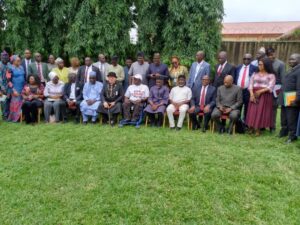
Nigeria ranked 116 out of 120 countries reviewed in the 2025 edition of the Chandler Good Government Index. It dropped six places from its place in the 2024 edition of the Index. The 120 countries were reviewed across seven good governance pillars of capabilities and outcomes. Nigeria was ranked 110 on leadership and foresight; 112 on robust law and policies; 114 on strong institutions; 89 in financial stewardship; 114 on attractive marketplace; 112 on global influence and reputation, and 120 on helping people to rise.
According to the Chandler Institute of Governance, the index offers governments practical benchmarks to track progress, identify gaps, and strengthen public institutions.
Countries were assessed on leadership and foresight; robust laws and policies; strong institutions; financial stewardship; attractive marketplace; global influence and reputation as well as on helping people rise.
A press statement released by the Institute in South Africa, on August 26, indicated that Mauritius was the leading government in Africa, followed by Rwanda and Botswana on the index, which is now in its fifth year and provides one of the most comprehensive global measures of government capabilities and effectiveness.
Speaking at the launch of the report in Pretoria, Dinesh Naidu, Director (Knowledge) at the Chandler Institute of Governance, who was speaking at a recent regional launch of the Index in Pretoria, said the index was a reflection of Africa’s governance journey. The launch attracted government officials, academics, investors and top businessmen from around the world.
“As a region, Africa still has significant work to do in improving the quality of governance,” notes Naidu. “However, the recent progress recorded suggests an upward trajectory. Even in a challenging global environment, high performance African countries are making governance advances that can inspire peers across the continent.”
In the 2025 rankings, Mauritius (51), Rwanda (59), Botswana (61), Morocco (75), and South Africa (77) emerged as the top five regional performers. While Mauritius remains the continent’s highest-ranked country for a fifth consecutive year, Rwanda stood out as the world’s best-performing low-income country, showing that national wealth is not necessarily a pre-requisite for effective government.
Botswana has improved its judiciary quality through digitalisation reforms in recent years, while Morocco has made notable strides in data transparency and digital infrastructure. South Africa, despite fiscal pressures, remains one of the continent’s stronger performers and a key reference point for institutional capacity.
“South Africa continues to demonstrate real strengths in the areas of Robust Laws and Policies, as well as Strong Institutions, which help it remain among Africa’s top five performers,” says Naidu. “At the same time, persistent fiscal pressures and challenges in social outcomes highlight the importance of strengthening delivery in areas such as employment and income distribution. South Africa has the frameworks in place – it now needs to focus on turning this capability into more inclusive and tangible results for citizens.”
Although outside the continental top five, Tanzania has recorded the most improvement of any African country since the Index was first published in 2021, rising from 82nd to 78th globally. In recent years, Tanzania’s government has expanded digital governance initiatives and introduced structural reforms to improve administrative efficiency and service delivery. The government’s Digital Tanzania Project is laying a foundation for technology‑driven governance solutions, while new regulatory frameworks, such as the Data Protection Act, seek to enhance security in the digital space.
The CGGI shows that Africa’s average governance score remains the lowest out of all regions worldwide. Only two countries – Tanzania and Rwanda – improved their rankings between 2021 and 2025. Financial Stewardship continues to be a major area of concern, as fiscal envelopes tighten and government debt burdens weigh heavily across the region.
At the same time, the continent’s strong demographic momentum offers promising opportunities. It states that with 70% of Sub-Saharan Africa’s population under 30, governments that can deliver on jobs, education, and inclusive growth stand to unlock a powerful dividend.
“What is encouraging is the progress in areas such as strong institutions and digital governance,” notes Naidu. “Across Africa, we are seeing examples of governments innovating to improve service delivery and strengthen accountability. These reforms show that even in a tough global environment, progress is possible.”
ABOUT THE CHANDLER INSTITUTE OF GOVERNANCE (CIG):
The Chandler Institute of Governance (CIG) is a non-profit organisation that works with governments worldwide to build a strong and efficient public sector. We are a team of seasoned government practitioners grounded in real-world experience, focusing on the critical ‘how’ of governance in our partnerships with governments to strengthen institutions and systems, equip leaders, and share knowledge. Drawing on proven practices from Singapore and around the world, we tailor our solutions to each country’s unique needs – because context matters in governance. We are not affiliated with any national government or political party, and we do not represent any partisan or commercial interests.






Join the Conversation